Analyzing Work Through Sociological Theories: Impact and Changes
VerifiedAdded on 2023/06/18
|9
|2618
|225
Essay
AI Summary
This essay provides a comprehensive analysis of work from a sociological perspective, exploring its definition, historical evolution, and the reasons behind current working practices. It delves into the application of two prominent sociological theories: conflict theory, which highlights the inherent tensions between employers and employees, and functionalist theory, which emphasizes the benefits of work in providing social identity and economic stability. The essay also examines the impacts of both work and worklessness on individuals, the role of work in defining social class, and the significant changes that have occurred in the nature of work over time, particularly in the context of technological advancements and globalization. The document is available on Desklib, a platform offering a wealth of study resources for students.

Essay
Paraphrase This Document
Need a fresh take? Get an instant paraphrase of this document with our AI Paraphraser

Table of Contents
INTRODUCTION ..........................................................................................................................3
MAIN BODY ..................................................................................................................................3
CONCLUSION ...............................................................................................................................8
REFERENCES................................................................................................................................9
INTRODUCTION ..........................................................................................................................3
MAIN BODY ..................................................................................................................................3
CONCLUSION ...............................................................................................................................8
REFERENCES................................................................................................................................9
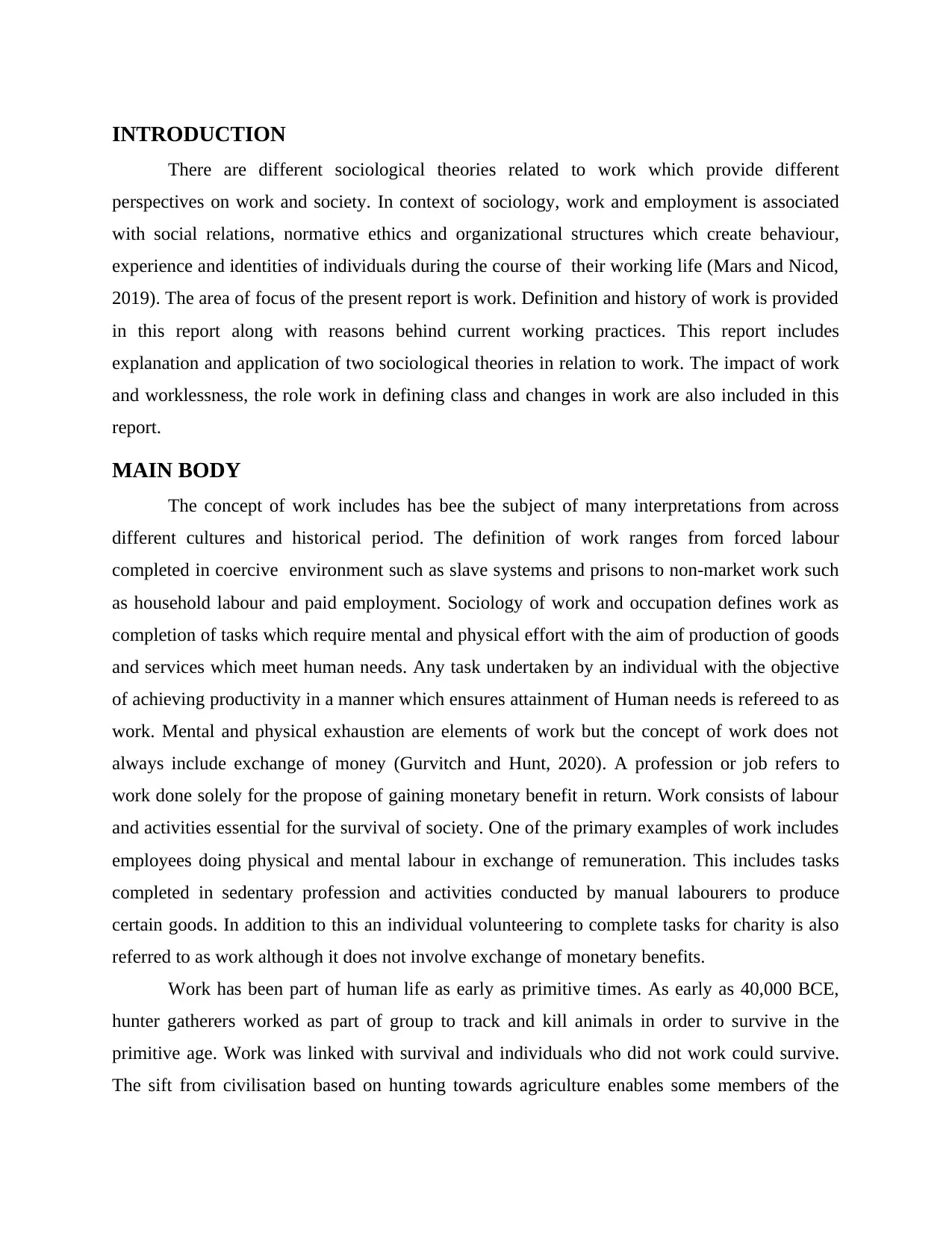
INTRODUCTION
There are different sociological theories related to work which provide different
perspectives on work and society. In context of sociology, work and employment is associated
with social relations, normative ethics and organizational structures which create behaviour,
experience and identities of individuals during the course of their working life (Mars and Nicod,
2019). The area of focus of the present report is work. Definition and history of work is provided
in this report along with reasons behind current working practices. This report includes
explanation and application of two sociological theories in relation to work. The impact of work
and worklessness, the role work in defining class and changes in work are also included in this
report.
MAIN BODY
The concept of work includes has bee the subject of many interpretations from across
different cultures and historical period. The definition of work ranges from forced labour
completed in coercive environment such as slave systems and prisons to non-market work such
as household labour and paid employment. Sociology of work and occupation defines work as
completion of tasks which require mental and physical effort with the aim of production of goods
and services which meet human needs. Any task undertaken by an individual with the objective
of achieving productivity in a manner which ensures attainment of Human needs is refereed to as
work. Mental and physical exhaustion are elements of work but the concept of work does not
always include exchange of money (Gurvitch and Hunt, 2020). A profession or job refers to
work done solely for the propose of gaining monetary benefit in return. Work consists of labour
and activities essential for the survival of society. One of the primary examples of work includes
employees doing physical and mental labour in exchange of remuneration. This includes tasks
completed in sedentary profession and activities conducted by manual labourers to produce
certain goods. In addition to this an individual volunteering to complete tasks for charity is also
referred to as work although it does not involve exchange of monetary benefits.
Work has been part of human life as early as primitive times. As early as 40,000 BCE,
hunter gatherers worked as part of group to track and kill animals in order to survive in the
primitive age. Work was linked with survival and individuals who did not work could survive.
The sift from civilisation based on hunting towards agriculture enables some members of the
There are different sociological theories related to work which provide different
perspectives on work and society. In context of sociology, work and employment is associated
with social relations, normative ethics and organizational structures which create behaviour,
experience and identities of individuals during the course of their working life (Mars and Nicod,
2019). The area of focus of the present report is work. Definition and history of work is provided
in this report along with reasons behind current working practices. This report includes
explanation and application of two sociological theories in relation to work. The impact of work
and worklessness, the role work in defining class and changes in work are also included in this
report.
MAIN BODY
The concept of work includes has bee the subject of many interpretations from across
different cultures and historical period. The definition of work ranges from forced labour
completed in coercive environment such as slave systems and prisons to non-market work such
as household labour and paid employment. Sociology of work and occupation defines work as
completion of tasks which require mental and physical effort with the aim of production of goods
and services which meet human needs. Any task undertaken by an individual with the objective
of achieving productivity in a manner which ensures attainment of Human needs is refereed to as
work. Mental and physical exhaustion are elements of work but the concept of work does not
always include exchange of money (Gurvitch and Hunt, 2020). A profession or job refers to
work done solely for the propose of gaining monetary benefit in return. Work consists of labour
and activities essential for the survival of society. One of the primary examples of work includes
employees doing physical and mental labour in exchange of remuneration. This includes tasks
completed in sedentary profession and activities conducted by manual labourers to produce
certain goods. In addition to this an individual volunteering to complete tasks for charity is also
referred to as work although it does not involve exchange of monetary benefits.
Work has been part of human life as early as primitive times. As early as 40,000 BCE,
hunter gatherers worked as part of group to track and kill animals in order to survive in the
primitive age. Work was linked with survival and individuals who did not work could survive.
The sift from civilisation based on hunting towards agriculture enables some members of the
⊘ This is a preview!⊘
Do you want full access?
Subscribe today to unlock all pages.

Trusted by 1+ million students worldwide
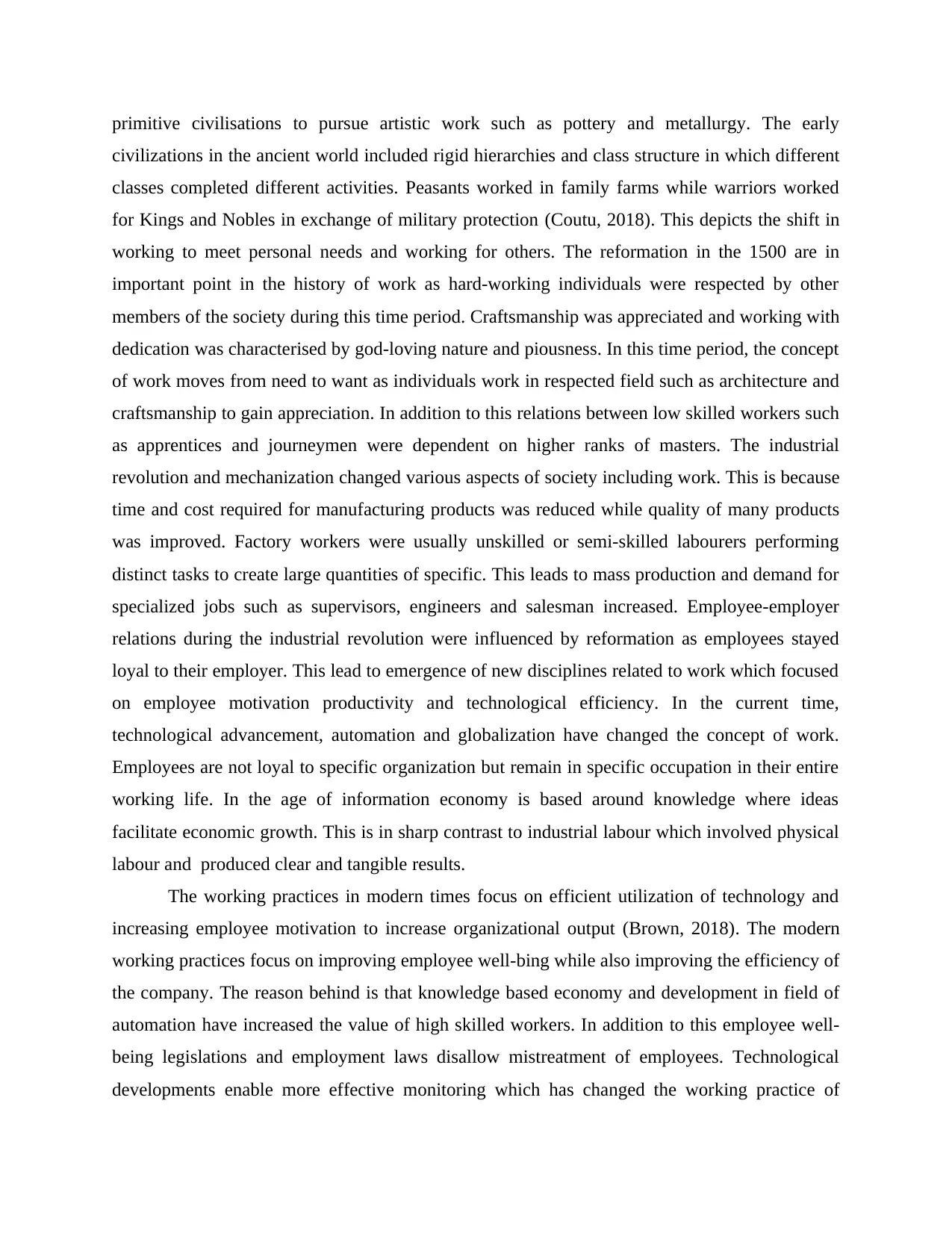
primitive civilisations to pursue artistic work such as pottery and metallurgy. The early
civilizations in the ancient world included rigid hierarchies and class structure in which different
classes completed different activities. Peasants worked in family farms while warriors worked
for Kings and Nobles in exchange of military protection (Coutu, 2018). This depicts the shift in
working to meet personal needs and working for others. The reformation in the 1500 are in
important point in the history of work as hard-working individuals were respected by other
members of the society during this time period. Craftsmanship was appreciated and working with
dedication was characterised by god-loving nature and piousness. In this time period, the concept
of work moves from need to want as individuals work in respected field such as architecture and
craftsmanship to gain appreciation. In addition to this relations between low skilled workers such
as apprentices and journeymen were dependent on higher ranks of masters. The industrial
revolution and mechanization changed various aspects of society including work. This is because
time and cost required for manufacturing products was reduced while quality of many products
was improved. Factory workers were usually unskilled or semi-skilled labourers performing
distinct tasks to create large quantities of specific. This leads to mass production and demand for
specialized jobs such as supervisors, engineers and salesman increased. Employee-employer
relations during the industrial revolution were influenced by reformation as employees stayed
loyal to their employer. This lead to emergence of new disciplines related to work which focused
on employee motivation productivity and technological efficiency. In the current time,
technological advancement, automation and globalization have changed the concept of work.
Employees are not loyal to specific organization but remain in specific occupation in their entire
working life. In the age of information economy is based around knowledge where ideas
facilitate economic growth. This is in sharp contrast to industrial labour which involved physical
labour and produced clear and tangible results.
The working practices in modern times focus on efficient utilization of technology and
increasing employee motivation to increase organizational output (Brown, 2018). The modern
working practices focus on improving employee well-bing while also improving the efficiency of
the company. The reason behind is that knowledge based economy and development in field of
automation have increased the value of high skilled workers. In addition to this employee well-
being legislations and employment laws disallow mistreatment of employees. Technological
developments enable more effective monitoring which has changed the working practice of
civilizations in the ancient world included rigid hierarchies and class structure in which different
classes completed different activities. Peasants worked in family farms while warriors worked
for Kings and Nobles in exchange of military protection (Coutu, 2018). This depicts the shift in
working to meet personal needs and working for others. The reformation in the 1500 are in
important point in the history of work as hard-working individuals were respected by other
members of the society during this time period. Craftsmanship was appreciated and working with
dedication was characterised by god-loving nature and piousness. In this time period, the concept
of work moves from need to want as individuals work in respected field such as architecture and
craftsmanship to gain appreciation. In addition to this relations between low skilled workers such
as apprentices and journeymen were dependent on higher ranks of masters. The industrial
revolution and mechanization changed various aspects of society including work. This is because
time and cost required for manufacturing products was reduced while quality of many products
was improved. Factory workers were usually unskilled or semi-skilled labourers performing
distinct tasks to create large quantities of specific. This leads to mass production and demand for
specialized jobs such as supervisors, engineers and salesman increased. Employee-employer
relations during the industrial revolution were influenced by reformation as employees stayed
loyal to their employer. This lead to emergence of new disciplines related to work which focused
on employee motivation productivity and technological efficiency. In the current time,
technological advancement, automation and globalization have changed the concept of work.
Employees are not loyal to specific organization but remain in specific occupation in their entire
working life. In the age of information economy is based around knowledge where ideas
facilitate economic growth. This is in sharp contrast to industrial labour which involved physical
labour and produced clear and tangible results.
The working practices in modern times focus on efficient utilization of technology and
increasing employee motivation to increase organizational output (Brown, 2018). The modern
working practices focus on improving employee well-bing while also improving the efficiency of
the company. The reason behind is that knowledge based economy and development in field of
automation have increased the value of high skilled workers. In addition to this employee well-
being legislations and employment laws disallow mistreatment of employees. Technological
developments enable more effective monitoring which has changed the working practice of
Paraphrase This Document
Need a fresh take? Get an instant paraphrase of this document with our AI Paraphraser
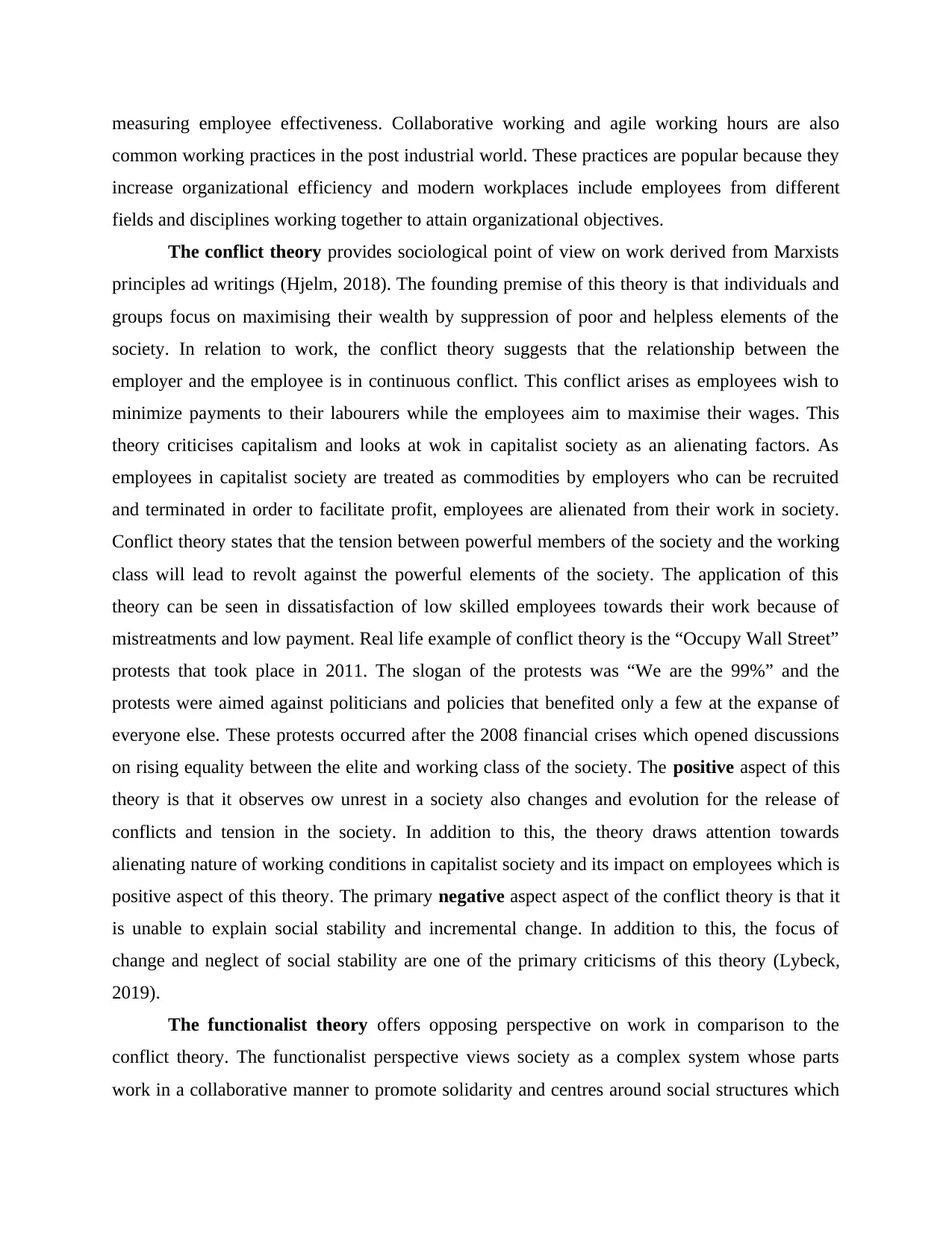
measuring employee effectiveness. Collaborative working and agile working hours are also
common working practices in the post industrial world. These practices are popular because they
increase organizational efficiency and modern workplaces include employees from different
fields and disciplines working together to attain organizational objectives.
The conflict theory provides sociological point of view on work derived from Marxists
principles ad writings (Hjelm, 2018). The founding premise of this theory is that individuals and
groups focus on maximising their wealth by suppression of poor and helpless elements of the
society. In relation to work, the conflict theory suggests that the relationship between the
employer and the employee is in continuous conflict. This conflict arises as employees wish to
minimize payments to their labourers while the employees aim to maximise their wages. This
theory criticises capitalism and looks at wok in capitalist society as an alienating factors. As
employees in capitalist society are treated as commodities by employers who can be recruited
and terminated in order to facilitate profit, employees are alienated from their work in society.
Conflict theory states that the tension between powerful members of the society and the working
class will lead to revolt against the powerful elements of the society. The application of this
theory can be seen in dissatisfaction of low skilled employees towards their work because of
mistreatments and low payment. Real life example of conflict theory is the “Occupy Wall Street”
protests that took place in 2011. The slogan of the protests was “We are the 99%” and the
protests were aimed against politicians and policies that benefited only a few at the expanse of
everyone else. These protests occurred after the 2008 financial crises which opened discussions
on rising equality between the elite and working class of the society. The positive aspect of this
theory is that it observes ow unrest in a society also changes and evolution for the release of
conflicts and tension in the society. In addition to this, the theory draws attention towards
alienating nature of working conditions in capitalist society and its impact on employees which is
positive aspect of this theory. The primary negative aspect aspect of the conflict theory is that it
is unable to explain social stability and incremental change. In addition to this, the focus of
change and neglect of social stability are one of the primary criticisms of this theory (Lybeck,
2019).
The functionalist theory offers opposing perspective on work in comparison to the
conflict theory. The functionalist perspective views society as a complex system whose parts
work in a collaborative manner to promote solidarity and centres around social structures which
common working practices in the post industrial world. These practices are popular because they
increase organizational efficiency and modern workplaces include employees from different
fields and disciplines working together to attain organizational objectives.
The conflict theory provides sociological point of view on work derived from Marxists
principles ad writings (Hjelm, 2018). The founding premise of this theory is that individuals and
groups focus on maximising their wealth by suppression of poor and helpless elements of the
society. In relation to work, the conflict theory suggests that the relationship between the
employer and the employee is in continuous conflict. This conflict arises as employees wish to
minimize payments to their labourers while the employees aim to maximise their wages. This
theory criticises capitalism and looks at wok in capitalist society as an alienating factors. As
employees in capitalist society are treated as commodities by employers who can be recruited
and terminated in order to facilitate profit, employees are alienated from their work in society.
Conflict theory states that the tension between powerful members of the society and the working
class will lead to revolt against the powerful elements of the society. The application of this
theory can be seen in dissatisfaction of low skilled employees towards their work because of
mistreatments and low payment. Real life example of conflict theory is the “Occupy Wall Street”
protests that took place in 2011. The slogan of the protests was “We are the 99%” and the
protests were aimed against politicians and policies that benefited only a few at the expanse of
everyone else. These protests occurred after the 2008 financial crises which opened discussions
on rising equality between the elite and working class of the society. The positive aspect of this
theory is that it observes ow unrest in a society also changes and evolution for the release of
conflicts and tension in the society. In addition to this, the theory draws attention towards
alienating nature of working conditions in capitalist society and its impact on employees which is
positive aspect of this theory. The primary negative aspect aspect of the conflict theory is that it
is unable to explain social stability and incremental change. In addition to this, the focus of
change and neglect of social stability are one of the primary criticisms of this theory (Lybeck,
2019).
The functionalist theory offers opposing perspective on work in comparison to the
conflict theory. The functionalist perspective views society as a complex system whose parts
work in a collaborative manner to promote solidarity and centres around social structures which
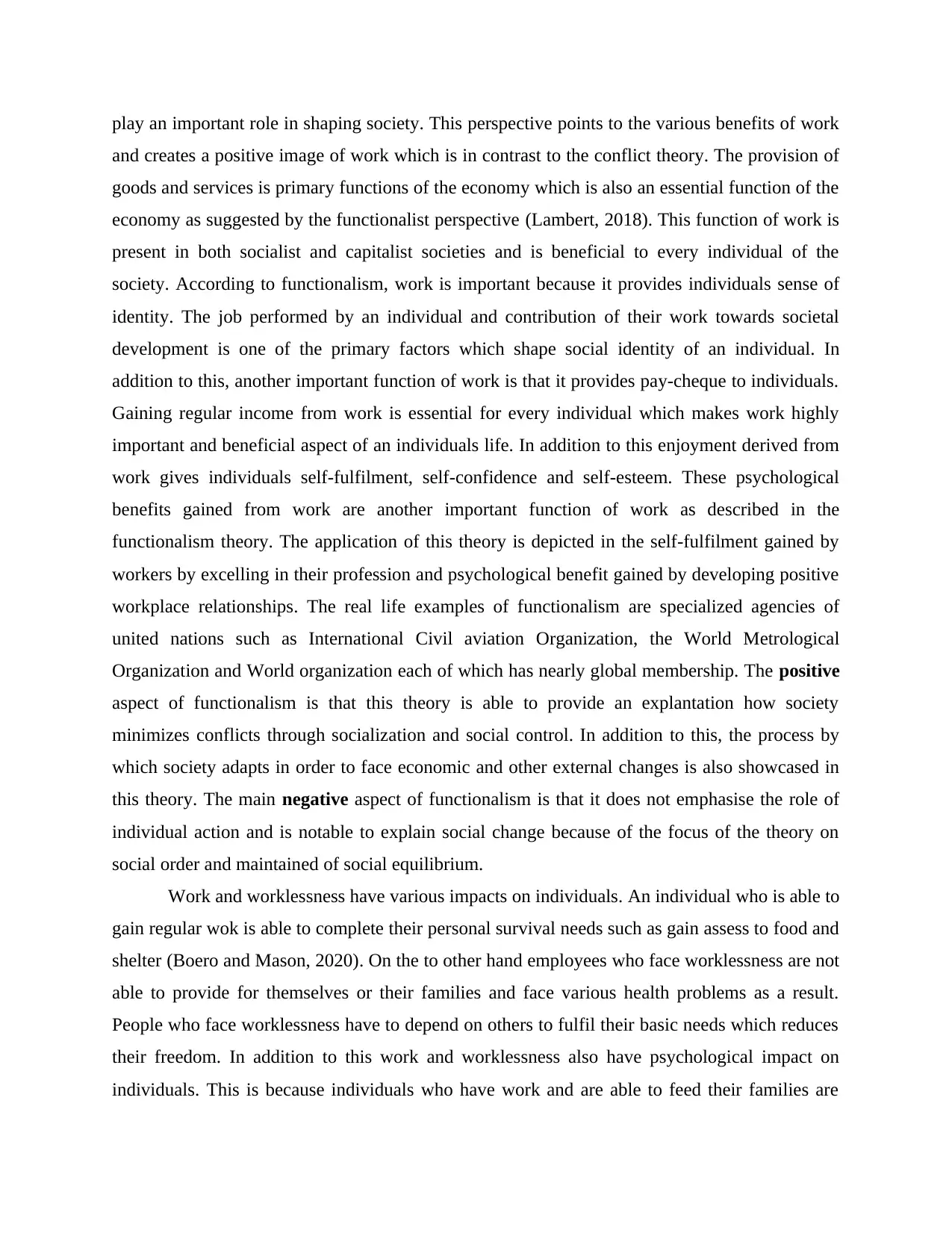
play an important role in shaping society. This perspective points to the various benefits of work
and creates a positive image of work which is in contrast to the conflict theory. The provision of
goods and services is primary functions of the economy which is also an essential function of the
economy as suggested by the functionalist perspective (Lambert, 2018). This function of work is
present in both socialist and capitalist societies and is beneficial to every individual of the
society. According to functionalism, work is important because it provides individuals sense of
identity. The job performed by an individual and contribution of their work towards societal
development is one of the primary factors which shape social identity of an individual. In
addition to this, another important function of work is that it provides pay-cheque to individuals.
Gaining regular income from work is essential for every individual which makes work highly
important and beneficial aspect of an individuals life. In addition to this enjoyment derived from
work gives individuals self-fulfilment, self-confidence and self-esteem. These psychological
benefits gained from work are another important function of work as described in the
functionalism theory. The application of this theory is depicted in the self-fulfilment gained by
workers by excelling in their profession and psychological benefit gained by developing positive
workplace relationships. The real life examples of functionalism are specialized agencies of
united nations such as International Civil aviation Organization, the World Metrological
Organization and World organization each of which has nearly global membership. The positive
aspect of functionalism is that this theory is able to provide an explantation how society
minimizes conflicts through socialization and social control. In addition to this, the process by
which society adapts in order to face economic and other external changes is also showcased in
this theory. The main negative aspect of functionalism is that it does not emphasise the role of
individual action and is notable to explain social change because of the focus of the theory on
social order and maintained of social equilibrium.
Work and worklessness have various impacts on individuals. An individual who is able to
gain regular wok is able to complete their personal survival needs such as gain assess to food and
shelter (Boero and Mason, 2020). On the to other hand employees who face worklessness are not
able to provide for themselves or their families and face various health problems as a result.
People who face worklessness have to depend on others to fulfil their basic needs which reduces
their freedom. In addition to this work and worklessness also have psychological impact on
individuals. This is because individuals who have work and are able to feed their families are
and creates a positive image of work which is in contrast to the conflict theory. The provision of
goods and services is primary functions of the economy which is also an essential function of the
economy as suggested by the functionalist perspective (Lambert, 2018). This function of work is
present in both socialist and capitalist societies and is beneficial to every individual of the
society. According to functionalism, work is important because it provides individuals sense of
identity. The job performed by an individual and contribution of their work towards societal
development is one of the primary factors which shape social identity of an individual. In
addition to this, another important function of work is that it provides pay-cheque to individuals.
Gaining regular income from work is essential for every individual which makes work highly
important and beneficial aspect of an individuals life. In addition to this enjoyment derived from
work gives individuals self-fulfilment, self-confidence and self-esteem. These psychological
benefits gained from work are another important function of work as described in the
functionalism theory. The application of this theory is depicted in the self-fulfilment gained by
workers by excelling in their profession and psychological benefit gained by developing positive
workplace relationships. The real life examples of functionalism are specialized agencies of
united nations such as International Civil aviation Organization, the World Metrological
Organization and World organization each of which has nearly global membership. The positive
aspect of functionalism is that this theory is able to provide an explantation how society
minimizes conflicts through socialization and social control. In addition to this, the process by
which society adapts in order to face economic and other external changes is also showcased in
this theory. The main negative aspect of functionalism is that it does not emphasise the role of
individual action and is notable to explain social change because of the focus of the theory on
social order and maintained of social equilibrium.
Work and worklessness have various impacts on individuals. An individual who is able to
gain regular wok is able to complete their personal survival needs such as gain assess to food and
shelter (Boero and Mason, 2020). On the to other hand employees who face worklessness are not
able to provide for themselves or their families and face various health problems as a result.
People who face worklessness have to depend on others to fulfil their basic needs which reduces
their freedom. In addition to this work and worklessness also have psychological impact on
individuals. This is because individuals who have work and are able to feed their families are
⊘ This is a preview!⊘
Do you want full access?
Subscribe today to unlock all pages.

Trusted by 1+ million students worldwide
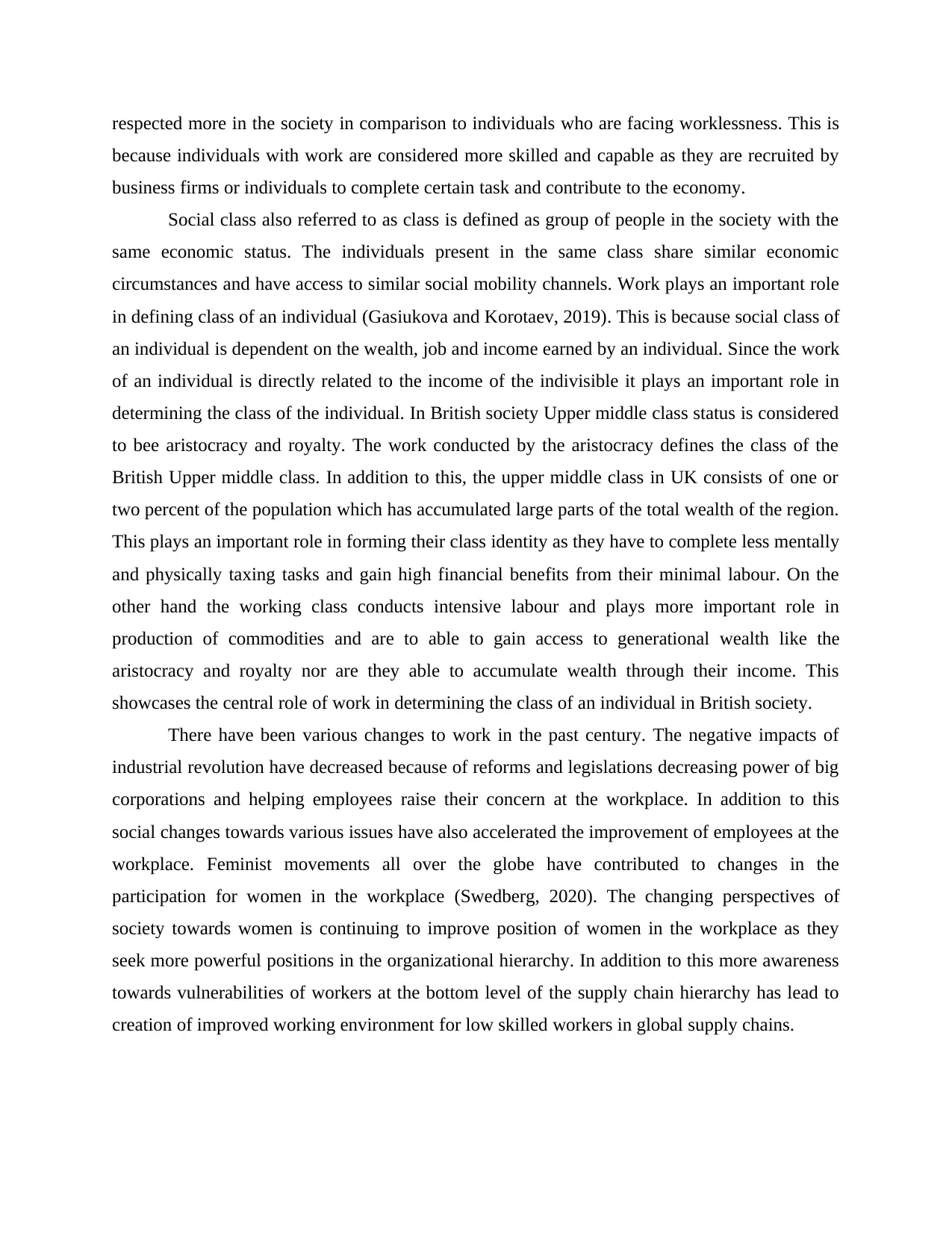
respected more in the society in comparison to individuals who are facing worklessness. This is
because individuals with work are considered more skilled and capable as they are recruited by
business firms or individuals to complete certain task and contribute to the economy.
Social class also referred to as class is defined as group of people in the society with the
same economic status. The individuals present in the same class share similar economic
circumstances and have access to similar social mobility channels. Work plays an important role
in defining class of an individual (Gasiukova and Korotaev, 2019). This is because social class of
an individual is dependent on the wealth, job and income earned by an individual. Since the work
of an individual is directly related to the income of the indivisible it plays an important role in
determining the class of the individual. In British society Upper middle class status is considered
to bee aristocracy and royalty. The work conducted by the aristocracy defines the class of the
British Upper middle class. In addition to this, the upper middle class in UK consists of one or
two percent of the population which has accumulated large parts of the total wealth of the region.
This plays an important role in forming their class identity as they have to complete less mentally
and physically taxing tasks and gain high financial benefits from their minimal labour. On the
other hand the working class conducts intensive labour and plays more important role in
production of commodities and are to able to gain access to generational wealth like the
aristocracy and royalty nor are they able to accumulate wealth through their income. This
showcases the central role of work in determining the class of an individual in British society.
There have been various changes to work in the past century. The negative impacts of
industrial revolution have decreased because of reforms and legislations decreasing power of big
corporations and helping employees raise their concern at the workplace. In addition to this
social changes towards various issues have also accelerated the improvement of employees at the
workplace. Feminist movements all over the globe have contributed to changes in the
participation for women in the workplace (Swedberg, 2020). The changing perspectives of
society towards women is continuing to improve position of women in the workplace as they
seek more powerful positions in the organizational hierarchy. In addition to this more awareness
towards vulnerabilities of workers at the bottom level of the supply chain hierarchy has lead to
creation of improved working environment for low skilled workers in global supply chains.
because individuals with work are considered more skilled and capable as they are recruited by
business firms or individuals to complete certain task and contribute to the economy.
Social class also referred to as class is defined as group of people in the society with the
same economic status. The individuals present in the same class share similar economic
circumstances and have access to similar social mobility channels. Work plays an important role
in defining class of an individual (Gasiukova and Korotaev, 2019). This is because social class of
an individual is dependent on the wealth, job and income earned by an individual. Since the work
of an individual is directly related to the income of the indivisible it plays an important role in
determining the class of the individual. In British society Upper middle class status is considered
to bee aristocracy and royalty. The work conducted by the aristocracy defines the class of the
British Upper middle class. In addition to this, the upper middle class in UK consists of one or
two percent of the population which has accumulated large parts of the total wealth of the region.
This plays an important role in forming their class identity as they have to complete less mentally
and physically taxing tasks and gain high financial benefits from their minimal labour. On the
other hand the working class conducts intensive labour and plays more important role in
production of commodities and are to able to gain access to generational wealth like the
aristocracy and royalty nor are they able to accumulate wealth through their income. This
showcases the central role of work in determining the class of an individual in British society.
There have been various changes to work in the past century. The negative impacts of
industrial revolution have decreased because of reforms and legislations decreasing power of big
corporations and helping employees raise their concern at the workplace. In addition to this
social changes towards various issues have also accelerated the improvement of employees at the
workplace. Feminist movements all over the globe have contributed to changes in the
participation for women in the workplace (Swedberg, 2020). The changing perspectives of
society towards women is continuing to improve position of women in the workplace as they
seek more powerful positions in the organizational hierarchy. In addition to this more awareness
towards vulnerabilities of workers at the bottom level of the supply chain hierarchy has lead to
creation of improved working environment for low skilled workers in global supply chains.
Paraphrase This Document
Need a fresh take? Get an instant paraphrase of this document with our AI Paraphraser
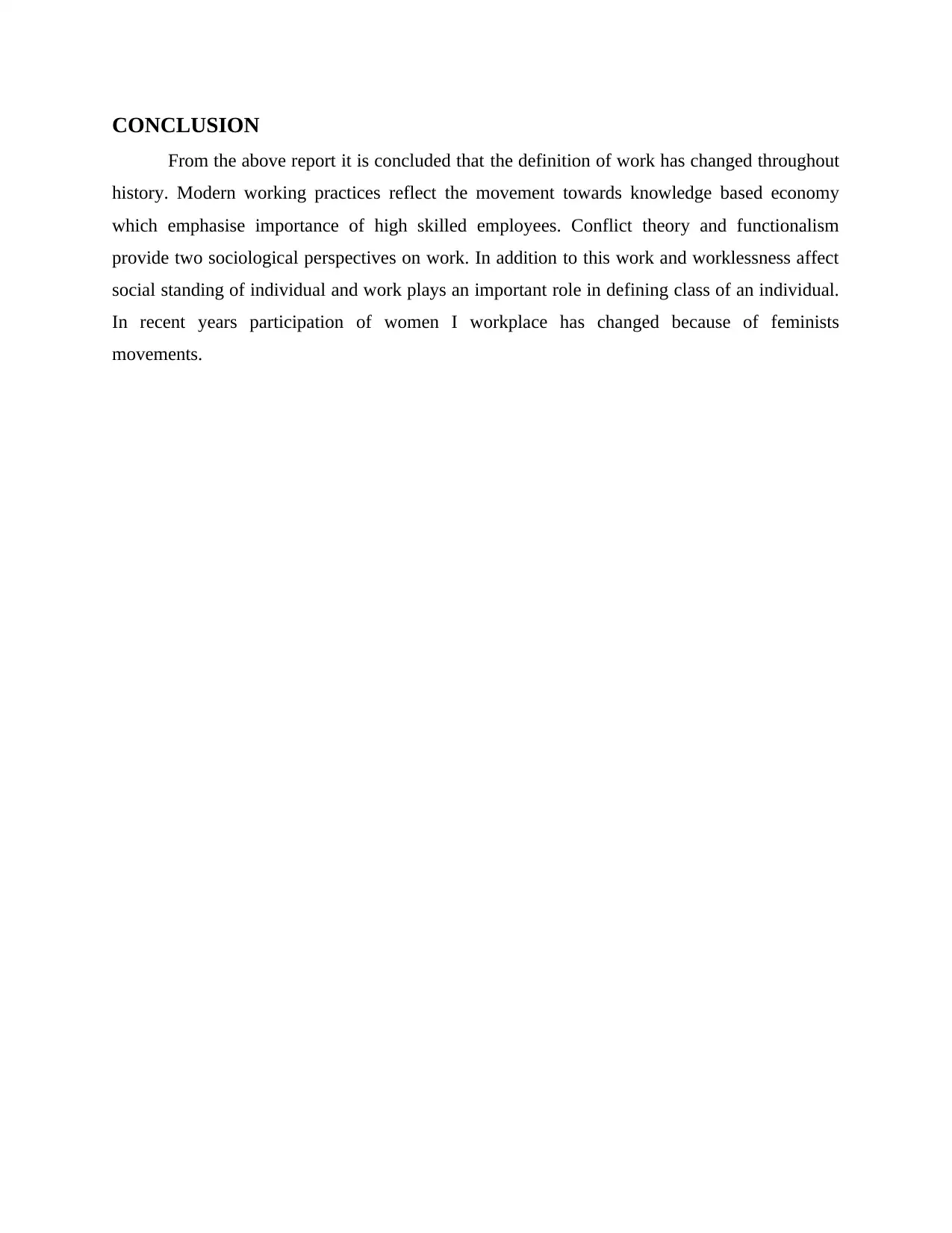
CONCLUSION
From the above report it is concluded that the definition of work has changed throughout
history. Modern working practices reflect the movement towards knowledge based economy
which emphasise importance of high skilled employees. Conflict theory and functionalism
provide two sociological perspectives on work. In addition to this work and worklessness affect
social standing of individual and work plays an important role in defining class of an individual.
In recent years participation of women I workplace has changed because of feminists
movements.
From the above report it is concluded that the definition of work has changed throughout
history. Modern working practices reflect the movement towards knowledge based economy
which emphasise importance of high skilled employees. Conflict theory and functionalism
provide two sociological perspectives on work. In addition to this work and worklessness affect
social standing of individual and work plays an important role in defining class of an individual.
In recent years participation of women I workplace has changed because of feminists
movements.
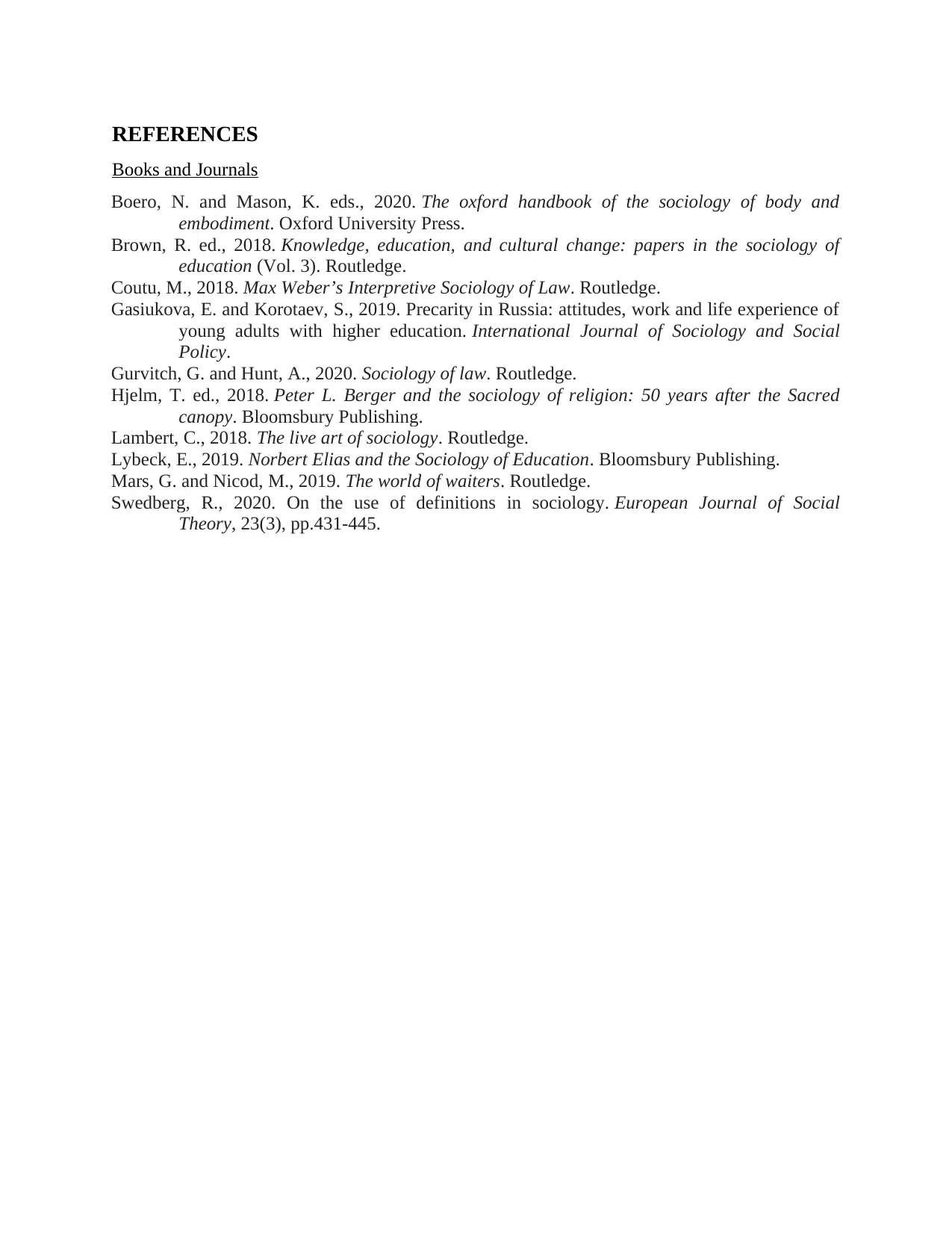
REFERENCES
Books and Journals
Boero, N. and Mason, K. eds., 2020. The oxford handbook of the sociology of body and
embodiment. Oxford University Press.
Brown, R. ed., 2018. Knowledge, education, and cultural change: papers in the sociology of
education (Vol. 3). Routledge.
Coutu, M., 2018. Max Weber’s Interpretive Sociology of Law. Routledge.
Gasiukova, E. and Korotaev, S., 2019. Precarity in Russia: attitudes, work and life experience of
young adults with higher education. International Journal of Sociology and Social
Policy.
Gurvitch, G. and Hunt, A., 2020. Sociology of law. Routledge.
Hjelm, T. ed., 2018. Peter L. Berger and the sociology of religion: 50 years after the Sacred
canopy. Bloomsbury Publishing.
Lambert, C., 2018. The live art of sociology. Routledge.
Lybeck, E., 2019. Norbert Elias and the Sociology of Education. Bloomsbury Publishing.
Mars, G. and Nicod, M., 2019. The world of waiters. Routledge.
Swedberg, R., 2020. On the use of definitions in sociology. European Journal of Social
Theory, 23(3), pp.431-445.
Books and Journals
Boero, N. and Mason, K. eds., 2020. The oxford handbook of the sociology of body and
embodiment. Oxford University Press.
Brown, R. ed., 2018. Knowledge, education, and cultural change: papers in the sociology of
education (Vol. 3). Routledge.
Coutu, M., 2018. Max Weber’s Interpretive Sociology of Law. Routledge.
Gasiukova, E. and Korotaev, S., 2019. Precarity in Russia: attitudes, work and life experience of
young adults with higher education. International Journal of Sociology and Social
Policy.
Gurvitch, G. and Hunt, A., 2020. Sociology of law. Routledge.
Hjelm, T. ed., 2018. Peter L. Berger and the sociology of religion: 50 years after the Sacred
canopy. Bloomsbury Publishing.
Lambert, C., 2018. The live art of sociology. Routledge.
Lybeck, E., 2019. Norbert Elias and the Sociology of Education. Bloomsbury Publishing.
Mars, G. and Nicod, M., 2019. The world of waiters. Routledge.
Swedberg, R., 2020. On the use of definitions in sociology. European Journal of Social
Theory, 23(3), pp.431-445.
⊘ This is a preview!⊘
Do you want full access?
Subscribe today to unlock all pages.

Trusted by 1+ million students worldwide
1 out of 9
Related Documents
Your All-in-One AI-Powered Toolkit for Academic Success.
+13062052269
info@desklib.com
Available 24*7 on WhatsApp / Email
![[object Object]](/_next/static/media/star-bottom.7253800d.svg)
Unlock your academic potential
Copyright © 2020–2026 A2Z Services. All Rights Reserved. Developed and managed by ZUCOL.





